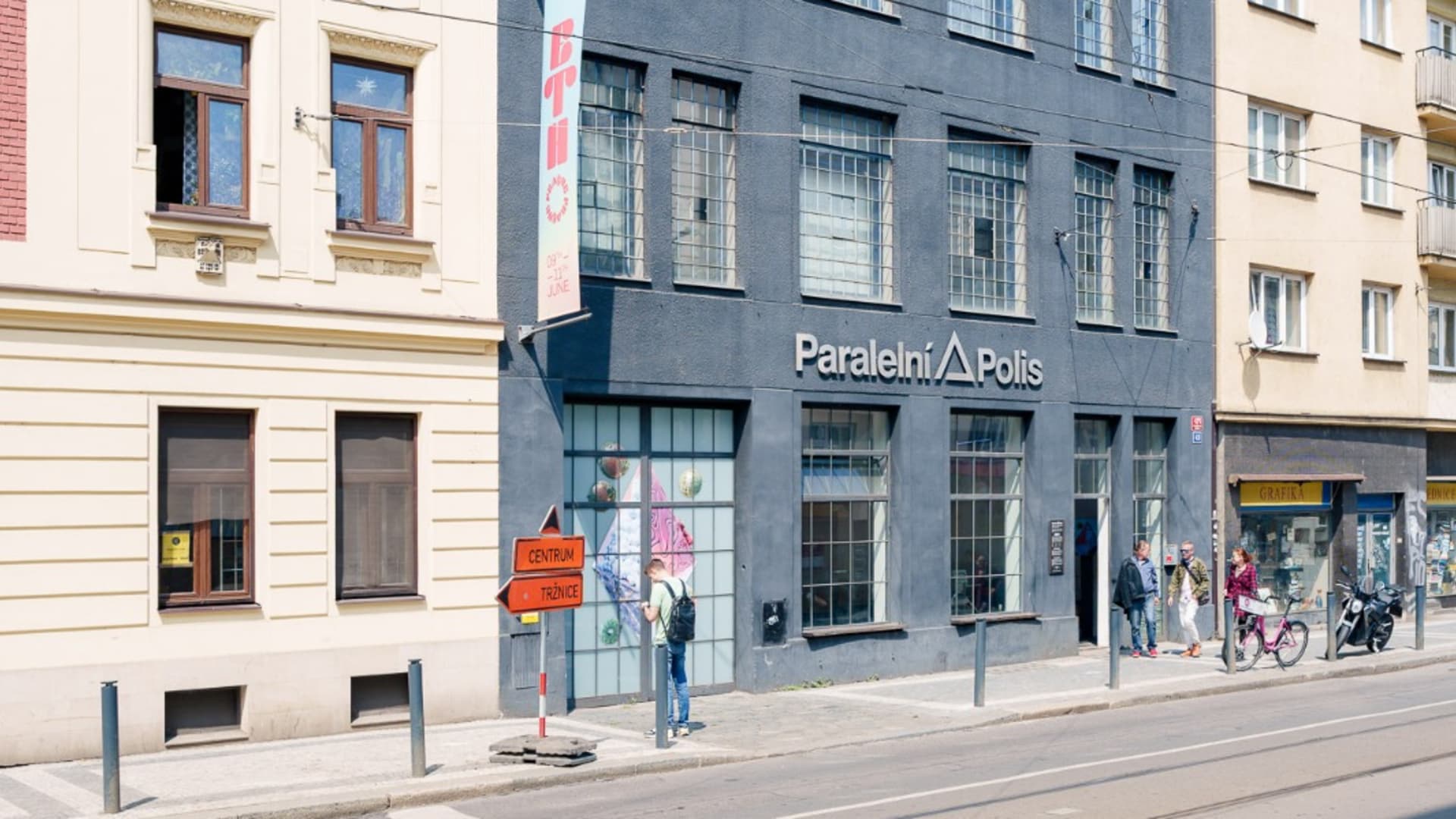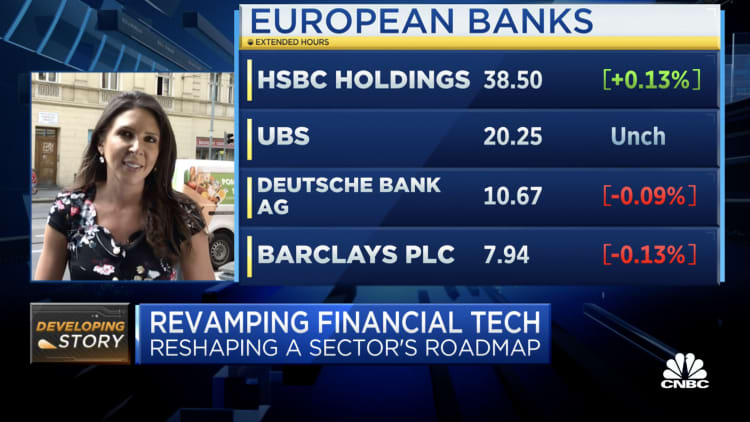Inside Prague’s Institute of Crypto Anarchy — where they’re plotting to bring down the dollar



ETHPrague 2023 was held at Paralelní Polis in the Czech Republic
Pavel Sinagl
PRAGUE — In 2007, a group of Czech guerrilla artists scaled a transmitter tower belonging to the country’s national television station and hacked into a live webcam of the Krkonoše mountain range typically used during the weather segment. In the midst of a live broadcast on June 17 of that year, the rebel collective — dubbed Ztohoven — faked a nuclear bomb detonation. Viewers watched as a camera shot panning across the landscape flashed white and revealed a mushroom cloud in the distance, reminiscent of a war-era newsreel threatening Armageddon.
The stunt was a signature move for the consortium of Bohemian subversives, one among many disruptive pranks over the course of decades designed to provoke onlookers and foster a sense of resistance and revolt against prescribed societal norms. Ztohoven has since added the banner of crypto anarchy to its mantle, embracing the hackers and provocateurs who helped mobilize the movement since its inception.
Today, that union of minds finds refuge in Prague in a retrofitted factory building called Paralelní Polis, or “parallel world.” The name pays homage to Czech philosopher and dissident, Václav Benda, who coined the phrase in the 1970s as a way to describe an emerging underground counterculture quietly subverting the ruling communist regime.
Ztohoven’s parallel world offers a different kind of anarchy. The space functions as a living example of how the world could look — a crucible for decentralized and defiant technologies designed to operate beyond the reach of governments, laws, and central banks.
It’s a place where cryptography replaces control, cryptocurrency supplants fiat, and controversial concepts aren’t just discussed, but are lived ideologies binding people together.
For more than two years, Dan Ligocký has been working from Polis three to five days a week. Ligocký, who is an event producer with deep ties to the ethereum community, tells CNBC that the space has served as a catalyst for innovation and the exploration of decentralized technologies.
“Its commitment to privacy, freedom, and self-sovereignty aligns with the core principles of the Web3 movement,” continued Ligocký. “We’re here to support the ecosystem and are open to collaborating with anyone whose ethos aligns with ours.”
Indeed, the vast factory-turned-forum pulses with the collective energy of digital rights activists, privacy-obsessed cypherpunks, and crypto-faithful ideologues. Its diverse denizens ranging from transient visitors like the Czech prince William Lobkowicz, to ethereum co-founder Vitalik Buterin.
Polis is a place where technology, philosophy, and activism converge.
Ethereum co-founder Vitalik Buterin speaks at ETHPrague 2023
Pavel Sinagl
The Czech Republic’s den of crypto anarchy sits in the heart of Holešovice — a district bound by the left bank of the Vltava River to the east and Letná Hill to the west. The neighborhood was once the epicenter of industrial Prague, synonymous with slaughterhouses and steam mills, but today is home to art galleries and ateliers.
At the opposite end of the city in a district called Hradčany — about three-and-a-half miles south-west of Polis — is a 750,000 square foot castle complex that appears frozen in a Renaissance-era alternate dimension. Its imposing Gothic spires loom over the Czech capital — a vestige of a time when inherited nobility meant something quite different to the people of Prague.
Private dinner held with coders and crypto enthusiasts at the Lobkowicz Palace in Prague
MacKenzie Sigalos | CNBC
Once the seat of Bohemian kings and Holy Roman emperors, Czech presidents now occupy the castle complex — a sprawling mass of palaces, churches, towers, hidden passageways, and gardens.
Two young nobles, William and Ileana Lobkowicz, sometimes hold crypto-centric events there. Neither live at the palace, but they use the stately halls and manors once inhabited by their ancestors for industry working groups on digital assets.
A multi-day annual conference called Non-Fungible Castle is their banner event, and the siblings have also spent the last few years tinkering with using NFTs as a way to fund restoration projects — an ambition that appears to have faded during the bear market as NFT sales and prices plummet.
This summer, however, the Lobkowicz family expanded their crypto outreach efforts by hosting some of the most established coders in the ethereum ecosystem for a one-day working session. The workshops were followed by a private tour of the castle and a multi-course gala dinner in the Imperial Hall at Lobkowicz Palace — an event where the conversation effortlessly shifted from Europe’s groundbreaking new crypto law to the convergence of generative AI and blockchain tech.
Private dinner held with coders and crypto enthusiasts at the Lobkowicz Palace in Prague
MacKenzie Sigalos | CNBC
The easiest way to get to the palace from Polis is to walk three minutes to the Maniny station, where Tram 25 stops every ten minutes before sweeping passengers up the hill to Prašný Most, which borders the castle grounds. The intricate web of trolley rails traces Prague’s cobblestoned streets, a pattern of steel tracks etched into the old-world urban landscape, while the stoic steel and glass trams serve as a moving tableau of life in Prague.
Although only 25 minutes apart, the two locations represent the split personality of the Czech people.
One side is the storybook Prague most people associate with the city — soaring towers, grand chandeliers, and original frescoes. The other is the secret Bohemian underground that has spent decades thwarting authoritarian regimes. For centuries, the Czech capital has been caught between historic powers with a bent toward world domination, which has helped the populace develop a thick skin and the knowhow to fight back against the world’s biggest villains.
Private dinner held with coders and crypto enthusiasts at the Lobkowicz Palace in Prague
MacKenzie Sigalos | CNBC
“Czechs are naturally skeptical of authority, a result of the tough 20th century during which Czechs experienced monarchy, Nazi occupation, and communist rule,” said Josef Tětek, a crypto economist and bitcoin analyst at hardware wallet provider, Trezor.
“A prime example of this skepticism is the fact that the Czech Republic never adopted the euro, even though it has been a member of the European Union since 2004,” Tětek added.
Call it the ultimate anti-fairytale.
In this story, the main character isn’t a prince in a high castle, but a decentralized collective of shadowy coders and hackers living in pockets across Prague who sometimes converge on Polis to swap trade secrets and sound a call to action.
The dark stucco of Polis’ Prague headquarters is an outlier among the ornate, brightly-colored buildings that tower over it. The interior of this deceptively nondescript structure is a honeycomb of winding, labyrinthine corridors and castle-like passageways that stretch endlessly higher and deeper into its fortress-like belly.
ETHPrague 2023 was held at Paralelní Polis in the Czech Republic
Pavel Sinagl
The ‘parallel world’ concept is sticky.
Franchises of Polis have sprung up in Vienna, Barcelona, and two Slovak cities — a testament to the enduring allure of anarchy. The Vienna branch goes so far as to self-describe as a living example of how “the Paralelní Polis cryptoliberation virus is spreading.”
These hubs share certain physical features — there are co-working tables for hire, conference halls for hackathons and blockchain-specific meet-ups, as well as spaces dedicated to experimental tech, where you can dabble with 3D printing and laser cuts.
In addition to hosting regular bitcoin and ethereum meetups, the Bratislava chapter also holds sessions dedicated to biohacking — or augmenting the human body with tech custom-engineered to create a new breed of superhumans. On the other side of Slovakia, in Košice, the Polis offers formal lectures and technical support, where locals can drop by for impromptu consultations on how blockchain and cryptocurrencies can support their business.
Another common fixture across these chapters is the so-called Institute of Cryptoanarchy, a sort of sub-franchise that provides free educational resources and classes to people keen to learn more about the unregulated internet, as well as the anonymous tools — blockchain-based virtual currencies and anti-spyware encryption protocols — that can help power a decentralized economy.
ETHPrague 2023 was held at Paralelní Polis in the Czech Republic
Pavel Sinagl
The crypto schooling helps with spurring adoption and enlisting more troops to the cause.
Today’s enemy is a little different than the communist and Nazi occupiers of the 20th century. Instead of a military-powered regime, these coders see their rival as a more insidious villain. The Austrian hub characterizes the threat not as a “distant dictatorial world,” but as the way current governments attempt to control the flow of information.
“States and their security agencies globally control access to information and use the protection of intellectual property as an excuse to apply total censorship to control the available resources,” reads part of the mission statement on their website.
As the U.S. crypto scene is imploding and companies dealing in digital assets face growing scrutiny from regulators, much of the developer community has flocked to international tech hubs like the Czech Republic to seek like-minded coders with a view to stick it to the man — or to at least steer clear of the establishment.
One reason why Prague has become the center of gravity for the industry has to do with its roots in the Austrian school of economics, a concept born out of 19th-century Vienna that remains quite popular in the Czech Republic today.
Carl Menger and Friedrich Hayek helped birth this particular brand of classical economic liberalism — not to be confused with the American concept of political liberalism. It holds independent individuals acting in their best economic self-interest is the optimal way to run a society and create a thriving economy, rather than centralized control or the heavy hand of state intervention.
ETHPrague 2023 was held at Paralelní Polis in the Czech Republic
Pavel Sinagl
“Adherents of this school of thought have been writing articles and books on bitcoin for the Czech audience since 2016,” Tětek told CNBC, who went on to note some of the natural synergies between bitcoin believers and economists schooled in Austrian economics.
“The Austrian school is very compatible with bitcoin adoption,” he said. “A central aspect is the call for a separation of money and state.”
Adherents of both worlds do not think the Federal Reserve can rescue the economy. Tětek added that bitcoin as an alternative independent monetary instrument thrives in this environment.
It helps that Prague has a long track record of drawing the sector’s top talent. The Czech capital is home to the world’s first hardware wallet and the first bitcoin mining pool. Bitcoin is accepted in Alza, one of the largest retail chains in the country, as well as in hundreds of other smaller businesses. The city also plays host to major international conferences drawing thousands to Bohemia each year.
“Overall, the bitcoin community in the Czech Republic is very strong, especially when measured per-capita,” said Tětek. “There are around 10 million Czech speakers. The most popular Czech bitcoin YouTuber boasts 90k subscribers, while the annual Czech-only bitcoin conference called Chaincamp attracts around 2000 visitors, even during the bear market.”
ETHPrague 2023 was held at Paralelní Polis in the Czech Republic
Pavel Sinagl
“Czechs are natural-born tinkerers; the early bitcoin projects such as Trezor and General Bytes emerged in the Prague hacker scene,” said Tětek, who has a background in Austrian economics and political philosophy. General Bytes is one of the larger bitcoin and crypto ATM manufacturers, which also provides software for Bitcoin ATM operators.
This summer, ETHPrague and BTCPrague held major summits in the capital over the same one-week window. The ethereum event organizers rented out space from Polis, while the bitcoiners descended on Prague’s jumbo-sized expo center at the outskirts of town.
BTCPrague talked a big game on event stats — 100+ speakers across four stages, 100+ companies and open-source projects at the expo, and 10,000+ attendees from all across Europe and beyond. While the venue was sprawling and packed on its first day, CNBC cannot independently confirm attendance numbers.
Some of the most notable names in the bitcoin ecosystem were there, including Microstrategy’s Michael Saylor, suspected Satoshi cryptographer and cypherpunk Adam Back, and best-selling economist and author Saifedean Ammous.
BTCPrague 2023 was held at the expo hall in the outskirts of the Czech capital
CNBC
Ancillary events complementing the dual crypto conferences took place across the city.
One was hosted in the private dining room of a steakhouse in Old Town where the merits of bitcoin — and its imminent threats — were debated until midnight. One point in contention: Whether Securities and Exchange Commission Chairman Gary Gensler is a closeted bitcoin maximalist, given it is the one digital asset that he has explicitly omitted from his concerted campaign to police and dismantle the ecosystem.
Meanwhile, ethereum enthusiasts descended on a modern houseboat in Holešovice for a beer tasting by the Czech Craft brewery Václav, where the Czech classic 12° Pils Vaclav and the buttery IPA 17° Sexy Hafanana were both on tap.
Another side event took place one morning at Trezor’s office, a modest space in the SatoshiLabs building located in a remote, residential suburb two miles north-east of Polis. The session included some of Prague’s top bitcoin founders — Matěj Žák, the CEO of Trezor; Jan Čapek, co-founder of Braiins, which proclaims to be the first company to introduce the concept of bitcoin mining pools; Christoph Kassas of General Bytes; and prominent Bitcoin YouTuber Jakub Vejmola. The discussion was more of a lecture-style format, with each of the leaders talking about current expansion efforts during the bear market.
The Braiins team also spoke about how they are bracing for imminent regulation in the space. The team described a protocol in development now that would make it so that pools are not capable of choosing the transactions that comprise each block — that way, they would avoid being blamed for violating any impending rules from the U.S. Treasury restricting the exchange of cryptocurrency.
“This extension to the protocol is essentially managed so that miners can choose their own work templates being approved by the pool, but then basically, the pool as a legal entity is out of the game, in terms of not being responsible for selecting the transaction,” explained Čapek.
A look around the room revealed an audience of a couple dozen people, filled with some of today’s most influential bitcoiners, including technologist and software engineer Jameson Lopp, a cypherpunk and co-founder of bitcoin security provider Casa, as well as the popular podcast hosts Stephan Livera and hedge fund manager-turned-bitcoiner Robert Breedlove.
Across town at Polis, Duct Tape Production put on ETHPrague, in coordination with the Ethereum Foundation.
ETHPrague 2023 was held at Paralelní Polis in the Czech Republic
Pavel Sinagl
The multi-day conference drew in the most influential thinkers in the space — including Buterin, one of the most prominent coders on the planet, and Stani Kulechov, founder and CEO of Aave and Lens.
Programming consisted of a mix of lectures and panels on everything from MiCA and self-regulation within decentralized finance, to the nuances of layer two protocols being built on top of ethereum. These working sessions brought together technologists, lawyers, and politicians from across the continent to discuss next steps for the industry.
“I was genuinely surprised at how helpful and friendly the participants were, how much altruism and reciprocity could be felt in their views and presentations, and the fact that they are close to the ‘build homes, not empires’ vision,” said Ondrej Polak, executive director of the newly-founded Czech Blockchain Association, who also describes himself as a practicing technology optimist and AI advocate.
ETHPrague 2023 was held at Paralelní Polis in the Czech Republic
Pavel Sinagl
Ligocky had a similar reaction to ETHPrague, saying it reaffirmed his belief that “the future of the internet is being reshaped by a vibrant global community of visionaries, developers, and entrepreneurs.”
“The sense of community and shared purpose was truly inspiring, as we collectively strive to unlock the limitless possibilities that lie ahead in this decentralized frontier,” continued Ligocky.
“ETHPrague is just the beginning,” he said, adding that they’re working on more events across Europe for teams that share the same vision.
